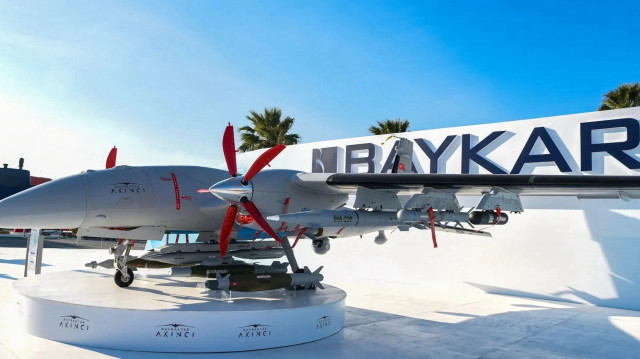
By acquiring Piaggio Aerospace, Baykar is signaling its intent to become a leader not just in UAV sector but also in broader aerospace and defense technologies
The recent approval granted by the Italian government to finalize Baykar's acquisition of Piaggio Aerospace has drawn significant attention and extensive press coverage. In a sector where technological advancements and innovation are of paramount importance, strategic acquisitions often serve as stepping stones to larger, more ambitious goals. Baykar, a Turkish defense company known for its groundbreaking unmanned aerial vehicles (UAVs), is poised to complete the acquisition of Piaggio Aerospace, an aerospace manufacturer headquartered on the Italian Riviera, renowned for its aircraft and propulsion systems, following a few additional formalities. This acquisition has the potential to be a breakthrough for both companies, enabling them to exploit synergies in critical technologies and pursue global market opportunities.
Baykar has already established itself as one of the global leaders in UAV technology. By acquiring Piaggio Aerospace, a company with deep expertise in aircraft design, propulsion systems, and aviation technologies, Baykar is positioning itself to reduce external dependence and broaden its technological base, particularly in manned aircraft and propulsion systems.
- Piaggio Aerospace: A strong technological foundation
Piaggio was founded in Genoa in 1884 by Rinaldo Piaggio, a visionary Italian entrepreneur who, after producing naval furnishings and railway components, foresaw the potential of the nascent aeronautical industry in 1915. The company has been honored over the decades by the work of brilliant engineers and technicians. One for all: Corradino D'Ascanio, father of the modern helicopter, variable pitch propeller and the iconic "Vespa" scooter.
Piaggio has received international awards for several historical records set by its innovative aircraft, which have demonstrated remarkable performance. Its P.180 Avanti, a twin-engine turboprop executive/light transport aircraft, is a notable example of innovative engineering, with a unique design aimed at combining high performance (speed, flight altitude, cabin comfort) and efficiency. Moreover, Piaggio is recognized for its contributions to aviation propulsion systems, manufacturing components and maintaining engines that power both commercial and military aircraft.
In recent years, Piaggio Aerospace has faced significant challenges, including financial difficulties, leading to a six-year receivership. The recent announcement of its acquisition by Baykar is a result of a competitive bidding process, with Baykar's proposal selected as the best option to relaunch the company. Piaggio's intellectual property, engineering expertise, and its plant in Villanova d'Albenga (with direct access to an airfield) are invaluable assets. It is safe to say that Baykar's acquisition of Piaggio is a brilliant opportunity to harness these capabilities while breathing new life (along with a vision and fresh capitals) into the company, merging its historical expertise with Baykar's modern technological acumen, visionary enthusiasm, global visibility and sales power.
- Potential synergies between Baykar and Piaggio Aerospace
The true potential of this acquisition lies in the synergies between Baykar's UAV technology and Piaggio Aerospace's manned aircraft technologies and engines. By integrating Piaggio's expertise in aircraft aerodynamics and propulsion, Baykar can develop platforms that combine the best of both unmanned and manned platforms.
By leveraging Piaggio's expertise in aerodynamics, aircraft design and propulsion systems, Baykar can create more efficient, versatile UAVs with longer endurance, higher speeds and greater operational altitudes, expanding the range of possible missions. This collaboration could also give rise to new drone concepts such as larger, long-range UAVs designed for complex, multi-role missions. It is also worth mentioning that in the years before the financial crisis and the receivership, Piaggio Aerospace designed and was developing/testing a UAV called P.1HH HammerHead, a remotely piloted aircraft system combining surveillance and reconnaissance capabilities with optimized performances coming from the Avanti platform.
On the flip side, Piaggio's existing aircraft platforms could be integrated with competitive and effective UAV technology, allowing for advanced drone-piloted aircraft coordination. The two companies could work on developing autonomous or semi-autonomous manned aircraft that can work alongside UAVs in coordinated air operations, such as surveillance, reconnaissance and so on.
- Baykar's long-term vision
By acquiring Piaggio Aerospace, Baykar is signaling its intent to become a leader not just in UAV sector but also in broader aerospace and defense technologies. The integration of Piaggio's capabilities will enable Baykar to diversify its product offerings and expand its technological edge, potentially positioning the company as a global leader in both unmanned and manned aerospace technologies.
With the integration of Piaggio Aerospace assets, Baykar will face a considerable challenge. The company must carefully manage the transition phase, engaging with all the stakeholders - from the Italian government to the local authorities, to the Unions and the workforce itself - while unlocking the company's full potential and addressing the issues resulting from a long period of uncertainty, reduced commercial momentum and lower aircraft production.
Baykar's acquisition of Piaggio Aerospace represents a significant moment for both companies and a substantial opportunity to create mutually beneficial synergies. By combining the cutting-edge UAV technology developed by Baykar and its thriving sales with Piaggio's deep and long-standing aerospace expertise, the deal offers interesting possibilities for technological advancements, particularly in the integration of UAVs and manned aircraft. With this strategic move, Baykar is laying the groundwork for a new era in aerospace technology, in the frame of the flourishing relationships and of the historical friendship between Italy and Türkiye.
*Opinions expressed in this article are the author's own and do not necessarily reflect Anadolu's editorial policy.
Hello, the comments you share on our site are a valuable resource for other users. Please respect other users and different opinions. Do not use rude, offensive, derogatory, or discriminatory language.
The floor is all yours.








